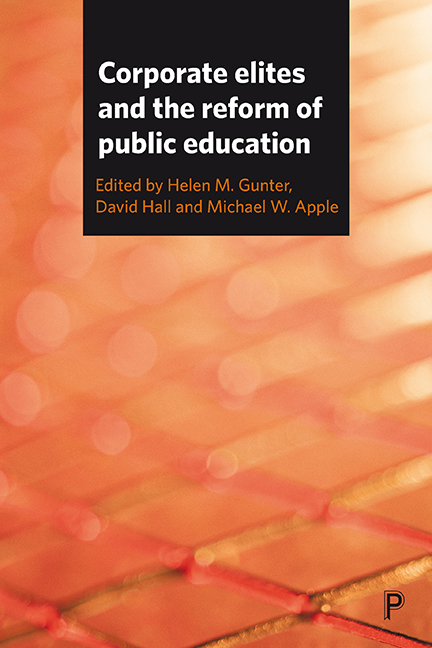Book contents
- Frontmatter
- Contents
- Foreword
- Notes on contributors
- Introduction: Scoping corporate elites and public education
- Part 1 Corporatised governance: system perspectives
- Part 2 Corporatised governance: provision perspectives
- Conclusion: The challenge of corporate elites and public education
- References
- Index
three - Fighting for the local: Americans for Prosperity and the struggle for school boards
Published online by Cambridge University Press: 05 April 2022
- Frontmatter
- Contents
- Foreword
- Notes on contributors
- Introduction: Scoping corporate elites and public education
- Part 1 Corporatised governance: system perspectives
- Part 2 Corporatised governance: provision perspectives
- Conclusion: The challenge of corporate elites and public education
- References
- Index
Summary
Introduction
The United States is witnessing the growing power of neoliberal and neoconservative agendas. One of the major sites of the increased influence of such political forces has been Wisconsin. In 2011, the conservative Wisconsin Governor Scott Walker historically cut the state's public education budget and curtailed the collective bargaining rights of the state's public sector employees. These changes spurred a mobilisation by progressive and grassroots groups around the state. In response, national corporate actors and organisations, especially those funded by the billionaire fossil fuel magnates the Koch brothers, used their money and organisational power to support neoliberal and neoconservative policies. After swathes of voters petitioned for a new election to remove (‘recall’) the governor, the Koch-funded political advocacy organisation Americans for Prosperity spent millions in advertising, bus tours and phone banks during the campaign for Walker's recall election (Lavender, 2011). Backed by such extensive corporate support, Walker won the recall election, emboldening the corporate sector to further engage in social and educational policy reform. This extension of influence is part of the story we wish to tell in this chapter.
The Koch brothers’ influence extends beyond high-profile state-level elections. These billionaires’ dollars have begun moving into municipal affairs in small cities and towns, such as school board elections like Kenosha, Wisconsin (Smith, 2014a) and Jefferson County, Colorado. This raises a crucial question. Why do groups like Americans for Prosperity care about small-town school board elections?
Understanding why multibillionaire individuals and the political organisations they fund are interested in small-scale micropolitics helps us to decipher the larger ideological processes at stake in building corporate influence. While the sheer volume of this economic capital reveals a new form of political economic determinism – that more money necessarily buys more political power – other dynamics are also at play (see, for example, Ball, 2009a; Reckhow and Snyder, 2014). Critical investigations of conservative movements must consider how politically conservative forces assemble and gather power at the local level in order to develop ideological strongholds.
This chapter highlights two particularly significant local examples in the United States: school board elections in Kenosha, Wisconsin in 2014 and in Jefferson County, Colorado in 2015. Through documentary analysis of school board records, news reports and district evaluations, in both Wisconsin and Colorado, we chronicle the political contest for control of each school board. Using a process tracing model, we note key sequences of events, outcomes and alliances (Collier, 2011).
- Type
- Chapter
- Information
- Corporate Elites and the Reform of Public Education , pp. 47 - 60Publisher: Bristol University PressPrint publication year: 2017



